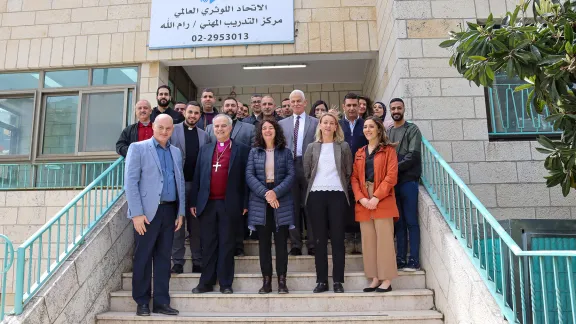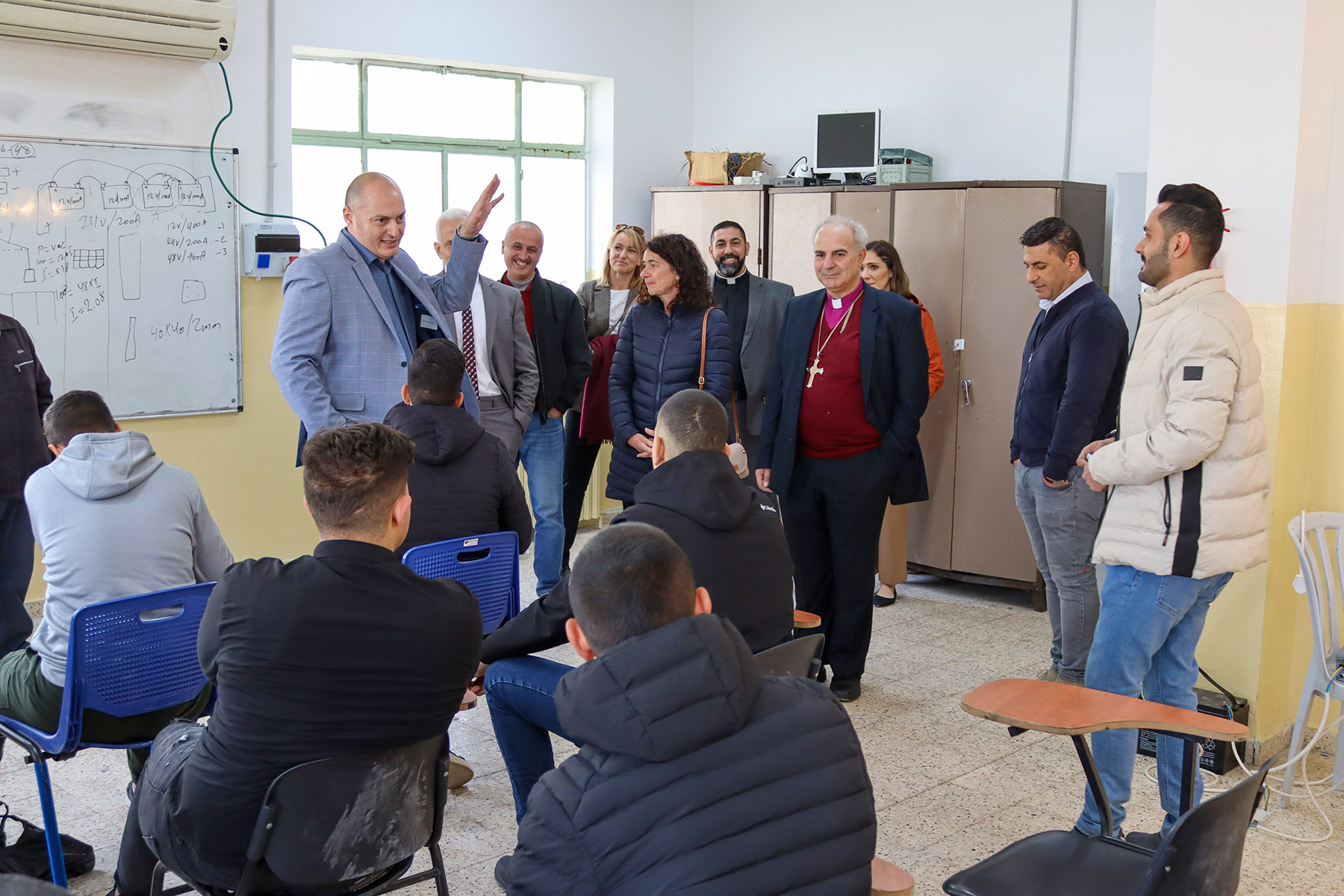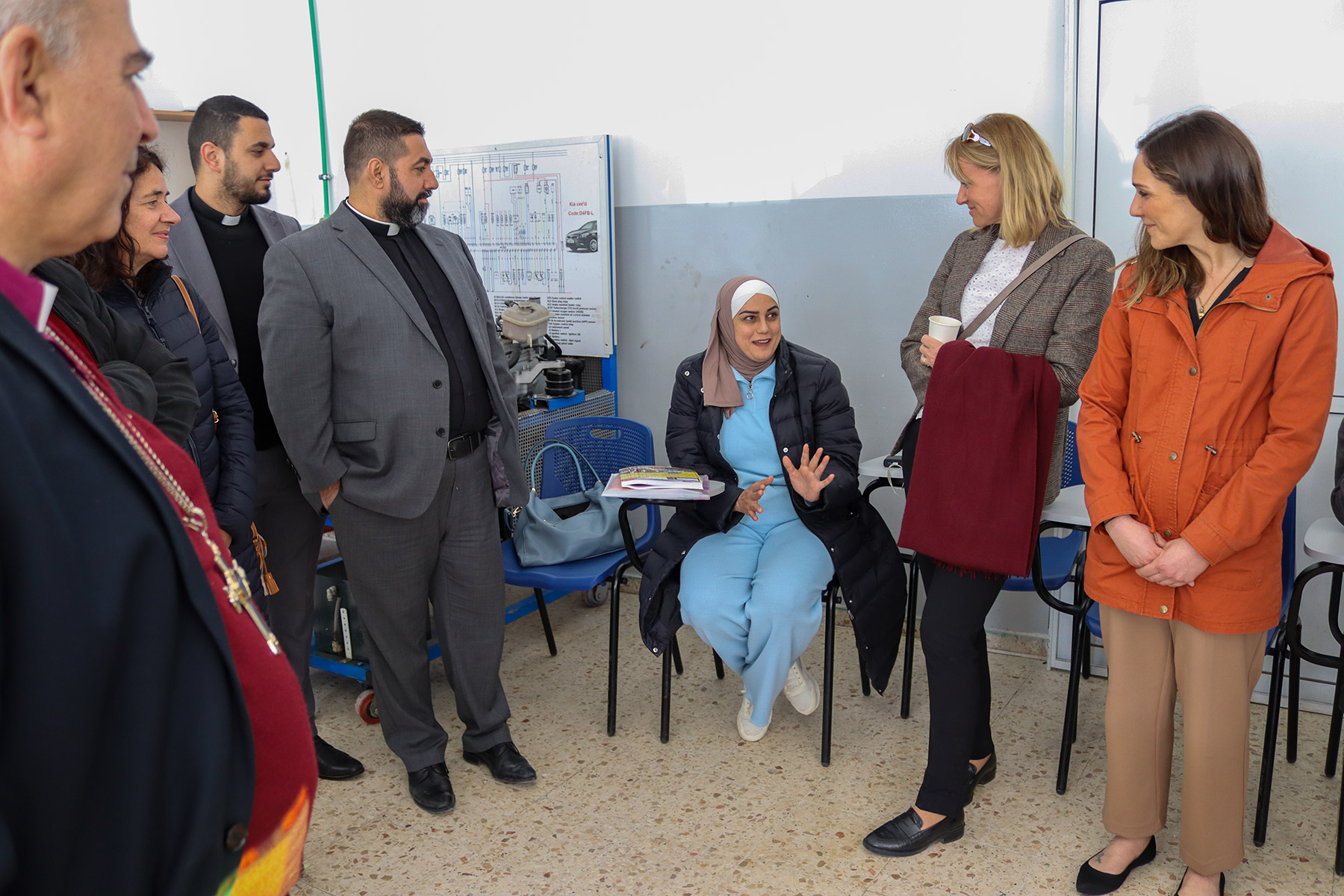
Outside LWF's vocational training center in Ramallah â front row from left, program director Yousef Shalian, Bishop Ibrahim Azar, LWF Representative Sieglinde Weinbrenner, LWF Regional Program Coordinator Caroline Tveoy and Heather Platt from Canadian Lutheran World Relief. The ELCJHLâs director of education Dr Charlie Haddad and the ELCAâs Rev. Gabi Aelabouni are behind them. All photos: Abd Al Rahman Hadidi
LWF and Lutheran church in Holy Land join together to strengthen inclusive technical training for women and men
(LWI) - The Lutheran World Federation (LWF) and The Evangelical Lutheran Church in Jordan and the Holy Land (ELCJHL) have stepped up their collaboration to strengthen vocational training opportunities for young Palestinian women and men. On 29 March, ELCJHL Bishop Sani Ibrahim Azar visited the newly renovated LWF training center in Ramallah, meeting with teachers and students to hear more about the way this work can contribute to the building up of Palestinian society.
The new vocational training center is housed in a former church-run school known as the School of Hope, which has moved to more suitable premises in the nearby suburb of Beitunia. The center, which still requires further renovation work, offers disability access and other facilities that were not available for special needs students at its previous location. Bishop Azar stressed that the conversion of the old school into “an innovative and inclusive vocational training center will be a significant boost to the program and its capacities to have a greater impact across Palestine.”

Bishop Azar and the visiting delegation from ELCJHL, LWF and partners meet students at LWF’s vocational training center
The ELCJHL’s director of education, Dr Charlie Haddad, is also enthusiastic about the opportunities that the center can offer to students looking for employment in the rapidly evolving sectors of computer programming and green energy development. “Vocational training is critical here in Palestine,” he says, “where parents traditionally want their children to become doctors, lawyers, academics or engineers, but the market is saturated for these people so it is very important to change this mindset.”
70 years of economic empowerment
A former director of the LWF vocational training program in the 1990s, Haddad has been working hard to integrate careers counselling into the church-run schools, located in Ramallah, Bethlehem, Beit Sahour, Beit Jala and Jerusalem. “There is a great need in this country for skilled laborers and technicians, so we encourage technically-minded students to consider the benefits of training for these market relevant qualifications,” he says.
LWF has been offering economic empowerment and vocational training for young Palestinians since 1949 and this work remains a cornerstone of its activities today. Two years ago, in March 2020, Bishop Azar and the LWF Representative in Jerusalem Sieglinde Weinbrenner signed a Memorandum of Understanding to begin converting the old school building into the upgraded facility for vocational training. “LWF has always collaborated closely with the church,” Haddad says, “but this increased cooperation is a vital step towards more targeted support for our students seeking to enter the labor market.”
We will continue to reinforce our gender-responsive approach over the coming years.
Over the last decade, Weinbrenner notes, there has been a major effort to include more female students in the training programs and to expand the number of professions accessible to women in the local economy. The goal is to support women’s economic independence within the family, as well as normalizing the participation of women in a wider range of jobs and activities. “We will continue to reinforce our gender-responsive approach over the coming years,” she adds.

One of two women, enrolled on the auto-mechanics course at LWF’s vocational training center, shares impressions of the warm welcome they received on this traditionally male-dominated course.
Almost one thousand young students from across the West Bank, Gaza and East Jerusalem attend the vocational training courses annually, in subjects that include carpentry, auto-mechanics, computer programming or graphic design. The two campuses in Ramallah and Beit Hanina offer both short and longer-term courses, with over 90 percent of graduates finding employment within six months after finishing their training.
“There is still a lot of work to do and a lot of resources needed to complete the conversion of the School of Hope,” Weinbrenner concludes, “but the joy and the energy among all those involved will surely make this task easier!”
LWF/P. Hitchen
LWF Jerusalem has provided vocational training for young Palestinian women and men for over 70 years. Its training centers focus on reaching those with limited opportunities due to precarious economic and social backgrounds, as well as those facing added challenges because of disabilities.


